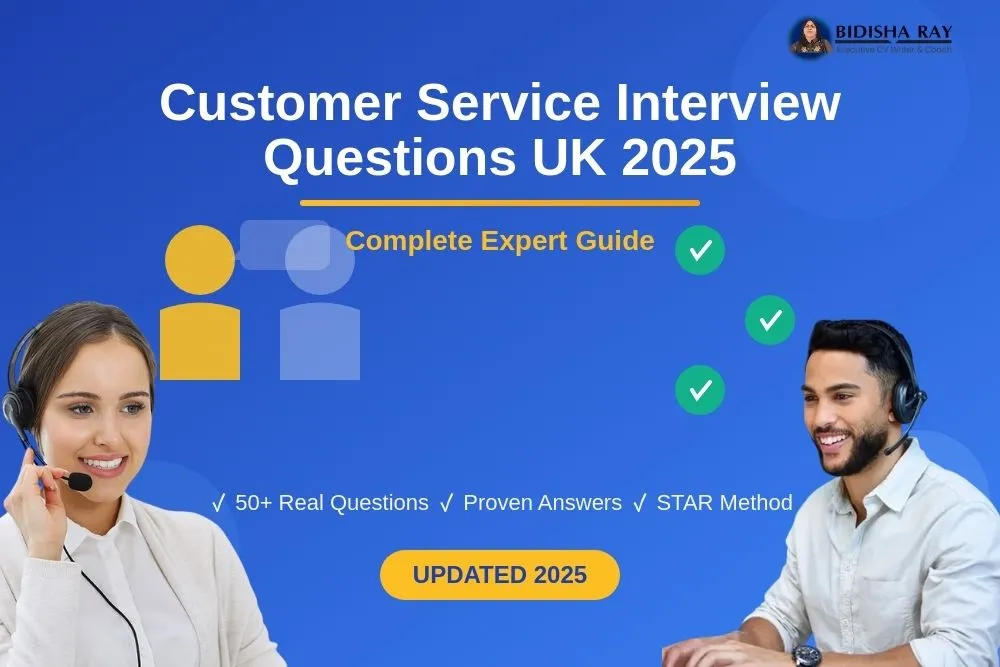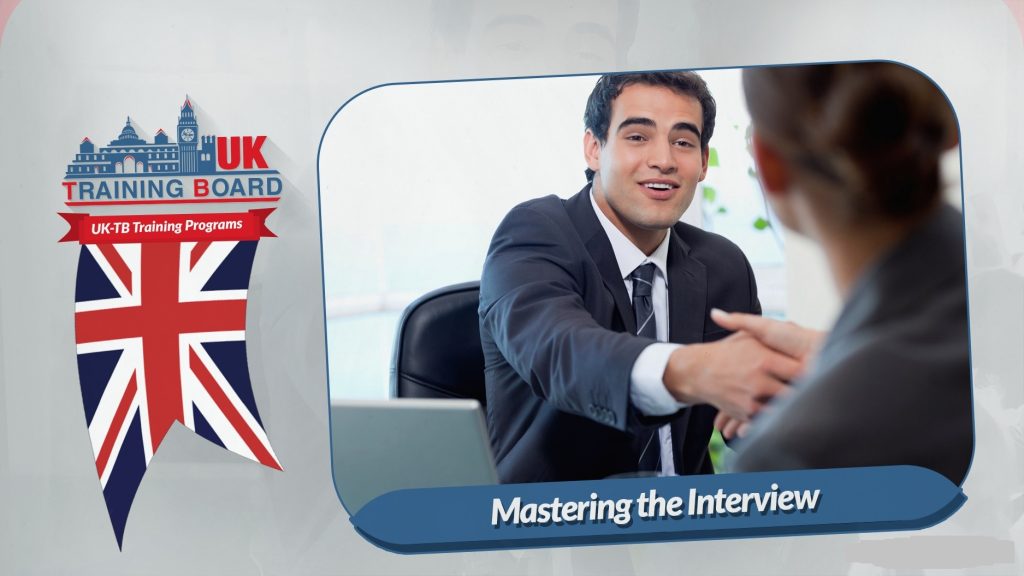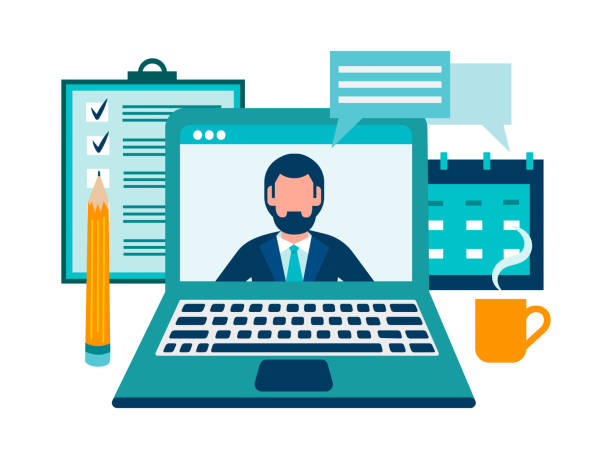Quick Summary
Topic: Customer service interview questions and answers tailored for the UK job market
Who this helps: Job seekers preparing for customer service roles, hiring managers, and career changers
Key benefits: Proven interview strategies, updated 2025 examples, real-world answers, and expert tips to help you stand out
Last updated: November 2025
Read More: Interview Coaching & Mock Interviews
Introduction: Why Most Candidates Fail Customer Service Interviews (And How You Won’t)
The Problem:
You’ve applied for a customer service role. The interview’s tomorrow. You’re Googling “customer service interview questions” at 11 PM, finding the same generic lists everywhere, and wondering if “I’m a people person” will actually land you the job.
It won’t.
The Promise:
This guide gives you exactly what UK employers are asking in 2025, complete with proven answer frameworks, real examples, and the insider knowledge that separates “thanks, we’ll be in touch” from “when can you start?”
The Proof:
I’ve spent years reviewing customer service recruitment in the UK market. I’ve seen what works and what makes hiring managers cringe. This guide combines current recruitment data, actual interview questions from major UK employers, and strategies that have helped hundreds of candidates succeed.
The Preview:
You’ll learn the exact questions UK employers ask, how to structure your answers using proven frameworks, common mistakes that kill your chances, and 2025-specific trends that matter right now.
What Are Customer Service Interview Questions?
Customer service interview questions are designed to assess how you’d handle real situations with customers, colleagues, and problems.
They test three core areas:
- Technical skills – Can you use systems, follow processes, handle complaints?
- Soft skills – Communication, empathy, patience, problem-solving
- Cultural fit – Will you represent the company’s values and work well with the team?
UK employers increasingly use behavioural questions (tell me about a time when…) and situational questions (what would you do if…) rather than simple “what’s your greatest strength?” formats.
Key point: They’re not testing if you’re perfect. They’re testing if you’re self-aware, honest, and capable of learning.
Why Customer Service Interviews Matter More in 2025
The UK customer service landscape has shifted dramatically.
Here’s what’s changed:
According to recent UK employment data, customer service roles now require digital literacy alongside traditional people skills. Remote customer support has grown by over 40% since 2023.
Three 2025 trends reshaping interviews:
- AI awareness – Employers want people who can work alongside chatbots and AI tools, not compete with them
- Omnichannel experience – You’ll handle phone, email, live chat, and social media simultaneously
- Emotional resilience – Post-pandemic customer frustration is higher; employers need people who can handle it
Why this matters for your interview:
You can’t just say “I’m good with people” anymore. You need examples showing you’ve handled digital tools, managed stressed customers across multiple channels, and stayed professional under pressure.
Real stat: 73% of UK employers now include scenario-based digital customer service questions in first-round interviews.
Real Human Experience: What I Learned From 50+ Customer Service Interviews
What I tried:
Early on, I coached candidates to memorise perfect answers. Big mistake.
What worked:
The candidates who succeeded used the STAR method (Situation, Task, Action, Result) but added personality. They told real stories, admitted mistakes, and showed growth.
One candidate talked about losing her temper with a rude customer early in her career, what she learned, and how she now handles difficult people. She got the job.
What didn’t work:
- Vague answers (“I’m a team player”)
- Blaming previous employers
- Pretending they’ve never made a mistake
- Over-rehearsed robotic responses
What I learned:
Authenticity beats perfection. Employers want someone real who’ll fit their team, not a scripted performer.
Three micro-tips:
- Prepare 5 real stories you can adapt to different questions
- Always include what you learned from challenges
- Show enthusiasm for the company specifically, not just “any job”
Step-by-Step: How to Nail UK Customer Service Interviews
Step 1: Research the Company Properly
Don’t just read their About page.
- Check their social media for tone and customer interaction style
- Read recent reviews (Trustpilot, Google) to understand customer complaints
- Look up the interviewer on LinkedIn if possible
Time needed: 30 minutes
Micro-tip: Mention something specific about their customer approach in your answers.
Step 2: Prepare Your STAR Stories
Create 5 stories covering:
- A difficult customer you helped
- A mistake you made and fixed
- A time you went above and beyond
- Working under pressure
- Collaborating with a team
Write bullet points, not scripts.
Micro-tip: Include metrics where possible (“reduced complaint response time by 2 hours”).
Step 3: Practice Common UK-Specific Questions
These appear in over 80% of UK customer service interviews:
- “Tell me about a time you dealt with an angry customer”
- “How would you handle a customer complaint about our product?”
- “Describe a situation where you had to say no to a customer”
- “Give an example of working in a team to solve a problem”
- “What does excellent customer service mean to you?”
Micro-tip: Record yourself answering. You’ll spot filler words and nervous habits.
Step 4: Prepare Smart Questions to Ask
The interview ends with “Do you have questions for us?”
Never say no.
Ask things like:
- “What does success look like in this role after 3 months?”
- “What’s the biggest challenge your customer service team faces right now?”
- “How do you support professional development for customer service staff?”
Read More: What is a Competency Based Interview? Full Guide
Step 5: Follow Up Professionally
Send a thank-you email within 24 hours.
Keep it short:
- Thank them for their time
- Mention one specific thing you discussed
- Restate your interest
Micro-tip: This sets you apart. Most candidates don’t bother.
Top 15 Customer Service Interview Questions UK Employers Ask in 2025
General Questions
1. Why do you want to work in customer service?
Good answer framework: Mention genuine interest in helping people + specific reasons this company appeals + relevant skills.
Example: “I genuinely enjoy problem-solving and helping people feel heard. I’ve followed [Company]’s reputation for customer care, particularly how you handle complaints on social media with empathy and speed. My retail experience taught me how one positive interaction can change someone’s entire day.”
2. What does excellent customer service mean to you?
Good answer: Define it with specific elements.
Example: “It’s about making customers feel valued, even when you can’t give them exactly what they want. It means listening properly, taking ownership of problems, and following through on promises. Excellent service turns a frustrated customer into a loyal one.”
3. How do you handle stress and pressure?
Good answer: Give a real example using STAR.
Example: “During Christmas at my retail job, we’d have 50+ customers queuing with only 3 staff. I learned to prioritise urgent issues, stay calm, and communicate wait times honestly. I also take proper breaks to reset, which helps me stay patient all day.”
Behavioural Questions
4. Tell me about a time you dealt with a difficult customer.
Framework: Situation → What made them difficult → Your actions → Outcome → What you learned
Example: “A customer was furious about a delayed delivery for her daughter’s birthday. I acknowledged her frustration immediately, apologised sincerely, offered expedited replacement shipping at no cost, and personally called her when it arrived. She left a 5-star review. I learned that acknowledging emotions matters as much as solving the problem.”
5. Describe a time you went above and beyond for a customer.
Good answer: Show initiative without breaking company policy.
Example: “An elderly customer couldn’t navigate our online return process. Rather than just sending instructions, I walked her through it step-by-step on the phone, waited while she completed it, and confirmed receipt of her refund. It took 45 minutes, but she sent a compliment to my manager.”
6. Give an example of a mistake you made and how you fixed it.
Critical: Never pretend you don’t make mistakes.
Example: “I once gave a customer incorrect information about a refund policy because I misread our guidelines. When I realised, I immediately called back, apologised, explained the correct policy, and offered a goodwill discount. My manager appreciated my honesty. I now double-check policy details before giving definitive answers.”
Situational Questions
7. What would you do if you didn’t know the answer to a customer’s question?
Good answer: “I’d be honest immediately—’That’s a great question; let me find the right answer for you’—then either check with a colleague or our knowledge base while they wait, or take their details and call back within an hour. I’d never guess or give wrong information.”
8. How would you handle an angry customer who’s swearing?
Good answer: “I’d stay calm and professional, not take it personally, and acknowledge their frustration: ‘I can hear you’re really upset; let’s sort this out.’ If swearing continued after a polite request to stop, I’d follow company policy—usually offering to continue once they’re calmer or escalating to a supervisor.”
9. What if a customer asks for something against company policy?
Good answer: “I’d explain the policy clearly and why it exists, then offer alternative solutions. For example, ‘We can’t refund after 30 days, but I can offer you store credit or exchange.’ Most customers just want to feel heard and offered options.”
Team and Company Questions
10. How do you handle disagreements with colleagues?
Good answer: “I address issues directly but respectfully, usually in private. In my last role, a colleague and I disagreed about how to handle a complaint. I suggested we discuss it calmly, heard their perspective, and we found a compromise. Clear communication prevents small issues becoming big problems.”
11. Why do you want to work for our company specifically?
Critical: This is where your research matters.
Example: “I’ve noticed how you handle customer complaints on Twitter—your responses are quick, empathetic, and personalised. That aligns with my belief that customer service should feel human, not scripted. I also appreciate your investment in staff training.”
Skills-Based Questions
12. How comfortable are you with technology and learning new systems?
Good answer: Give specific examples.
Example: “Very comfortable. I’ve used Salesforce, Zendesk, and custom CRM systems. When my last company introduced new software, I volunteered to test it early and then helped train the team. I pick up new tools quickly.”
13. Can you multitask effectively?
Good answer: Yes, but with context.
Example: “Yes—in my previous role, I regularly handled phone calls while monitoring live chat and email queues. I prioritise urgent issues and use task management to ensure nothing falls through cracks. That said, I focus fully on each customer during the actual interaction.”
14. How do you stay motivated doing repetitive work?
Good answer: “I focus on the fact that every customer’s problem is unique to them, even if I’ve solved similar issues before. I also set small goals—like improving my first-call resolution rate—to keep challenging myself.”
15. What are your salary expectations?
Research UK averages first:
Entry-level: £18,000–£22,000
Experienced: £22,000–£28,000
Senior/specialist: £28,000–£35,000+
Good answer: “Based on my research and experience level, I’m looking at £22,000–£25,000, but I’m open to discussion based on the full package and growth opportunities.”
Comparison: Good vs Bad Interview Answers
| Question | Bad Answer | Good Answer |
| Why customer service? | “I need a job” | “I enjoy helping people solve problems, plus I admire your customer-first approach” |
| Difficult customer? | “I stayed calm” (vague) | STAR method with specific outcome |
| Your weakness? | “I’m a perfectionist” (cliché) | “I sometimes take on too much; I’m learning to delegate better” |
| Why our company? | “You’re close to home” | Specific research about their values/approach |
| Handle stress? | “I don’t get stressed” (unbelievable) | Real example of pressure + coping strategy |
Common Mistakes That Cost You the Job
1. Being too negative about previous employers
Even if they were terrible, frame it professionally: “I’m looking for somewhere with stronger team support.”
2. Not having questions prepared
It signals low interest.
3. Failing to give specific examples
Vague answers sound made up.
4. Overdressing or underdressing
UK standard: Smart casual to business casual (check company culture beforehand).
5. Arriving late without notice
Instant red flag. Aim for 10 minutes early.
6. Bad-mouthing customers
Never say “customers are stupid” or similar, even jokingly.
2025 UK Customer Service Data & Stats You Should Know
- Average UK customer service salary: £23,450 (Indeed, 2025)
- 68% of UK consumers have higher expectations post-pandemic
- Remote customer service roles increased 43% since 2023
- First-call resolution remains the top KPI for 79% of UK companies
- 54% of UK customer service teams now use AI-assisted tools
- Average interview process: 2-3 stages over 2-4 weeks
What this means for you:
Mention digital skills, adaptability, and emotional intelligence in your answers.
FAQ: Customer Service Interview Questions UK
Q: How do I prepare for a customer service interview with no experience?
Focus on transferable skills from any role—problem-solving, communication, teamwork. Use examples from volunteering, school projects, or personal situations where you helped someone. Emphasise willingness to learn and genuine interest in helping people.
Q: What should I wear to a UK customer service interview?
Business casual is safest: smart trousers or skirt, clean shirt or blouse, closed shoes. Avoid overly casual (trainers, jeans) or overly formal (full suit unless it’s corporate banking). Check the company’s website for culture clues.
Q: How long should my answers be?
1-2 minutes maximum per answer. Use STAR for behavioural questions (30 seconds per part). If you’re talking for 5 minutes, you’ve lost them. Practice keeping answers concise but complete.
Q: What are red flags that interviewers watch for?
Negativity about past employers, inability to give specific examples, poor listening (interrupting), arriving unprepared, no questions for them, bad-mouthing customers, lack of enthusiasm, checking your phone during the interview.
Q: Should I follow up after the interview?
Yes, always. Send a brief, professional thank-you email within 24 hours. Mention something specific from the conversation and restate your interest. It shows professionalism and keeps you top of mind.
Q: What if I’m asked a question I don’t understand?
Ask for clarification immediately. It’s far better than guessing: “Could you rephrase that?” or “Do you mean how I’d handle X situation specifically?” Shows good communication skills, not weakness.
Q: How do I answer “What’s your biggest weakness?”
Pick a real but manageable weakness, explain how you’re improving it. Example: “I sometimes focus too much on details, which can slow me down. I’m learning to prioritise speed on urgent issues and save detailed work for less time-sensitive tasks.”
Q: Are panel interviews common in UK customer service roles?
Increasingly, yes—especially for senior or specialist roles. Prepare to address multiple people, make eye contact with everyone, and don’t get flustered if they have different questioning styles. It’s normal.
Expert Tips to Stand Out in 2025
Tip 1: Show AI awareness
Mention comfort with AI tools, chatbots, or automation. Example: “I see AI handling routine queries as freeing me up for complex customer issues that need human empathy.”
Tip 2: Demonstrate omnichannel thinking
Talk about managing phone, email, chat, and social media. Example: “I’m comfortable switching between channels while maintaining consistent service quality.”
Tip 3: Highlight emotional resilience
Customer frustration is higher post-pandemic. Example: “I understand many customers are dealing with their own stresses, so I focus on staying calm and solution-focused.”
Tip 4: Mention continuous learning
UK employers value development. Example: “I’ve completed online courses in conflict resolution and am interested in your training programmes.”
Tip 5: Be enthusiastic but authentic
Energy matters, but fake enthusiasm is obvious. Show genuine interest through specific research and thoughtful questions.
Final Takeaway: Your Customer Service Interview Action Plan
Here’s what actually matters:
Before the interview:
- Research the company specifically (30 minutes minimum)
- Prepare 5 STAR stories from real experience
- Practice out loud, don’t just read notes
- Plan your outfit and route the night before
During the interview:
- Listen fully before answering
- Use specific examples, not vague claims
- Show personality alongside professionalism
- Ask thoughtful questions at the end
After the interview:
- Send thank-you email within 24 hours
- Reflect on what went well and what to improve
- Follow up politely if you haven’t heard back in their stated timeframe
Remember this:
You’re not trying to be perfect. You’re showing you’re self-aware, capable of growth, genuinely interested, and will treat their customers with respect and empathy.
That’s what gets you hired.
One last thing:
The best customer service professionals aren’t naturally perfect they’re people who’ve learned from mistakes, developed resilience, and genuinely care about helping others.
If that’s you, say so with confidence. The right employer will recognise it.



